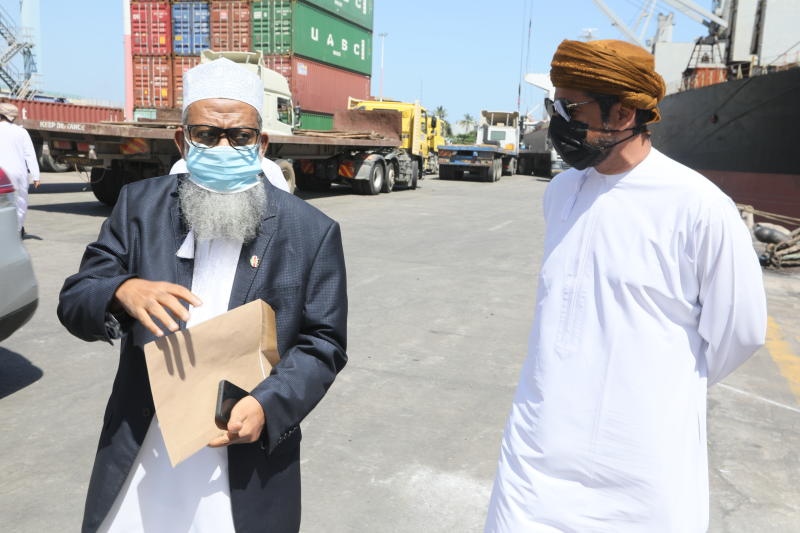
Kenyan envoy to Oman Sheikh Mohamed Dor (left) speaks with Al Bashayer Meat Company CEO Ghalib Alsaidi at the Port of Mombasa on Monday. Kenya has resumed exporting livestock to the Gulf States. [Omondi Onyango, Standard]
On Monday, the first shipment of 11,449 mixed-breed goats and sheep worth Sh226 million left Mombasa for the Port of Salalah in Oman.
The livestock shipment is the first to any of the Gulf States - Bahrain, Iran, Iraq, Kuwait, Oman, Qatar, Saudi Arabia and the United Arab Emirates - in the last 16 years.
The countries banned livestock exports from Kenya after an outbreak of Rift Valley Fever.
Kenyan envoy to Oman Sheikh Mahmud Dor said the ship that set sail from Mombasa Port berth 12 will also find its way to the other Gulf States that have lifted the ban.
“Oman has said it has the potential to import more than 500,000 heads annually. This is a guaranteed market for Kenyan livestock,” Mr Dor said during a ceremony at the port.
The Gulf States also form a big part of Kenya’s horticulture and floriculture export market.
Dor said the ship carrying the animals will take six days to reach Salalah. They are being ferried aboard a specially built livestock vessel christened Farah-1 that is flying the Zanzibar flag.
Ghalib Al Saidi, chief executive of Al Bashayer Meat Company that is coordinating the export, said his firm would work with Kenya’s Department of Veterinary Service to ensure healthy and quality animals are exported.
He said there is also a plan to export camels.
“Oman is the food basket of the Gulf region. Both Kenya and Oman stand to benefit from this livestock deal,” Mr Saidi said.
Jack Onyango, a manager for international trade at Al Bashayer, said the company intends to be undertaking two shipments every month to Oman from Mombasa.
“We are looking at volumes of between 15,000 and 25,000 animals, including cattle and camels, on a monthly basis,” he said.
Dor said major infrastructure projects that have upgraded Mombasa port, as well as a robust financial system in Kenya, have become attractive to the Gulf traders.
Two local suppliers, Zuridi Africa and Najib’s Livestock International, are working with the government to collect animals across the country for export.
The government is also aiming to make Lamu Port a major hub for livestock export, given its proximity to the North Eastern counties that are major producers of animal products.
Meanwhile, there was no Christmas celebration for 1O foreign crew members of a Kenyan-flagged fishing vessel abandoned at the Liwatoni Jetty at the Port of Mombasa.
The crew has been stuck at the jetty for a year now. Seo Hyundo, the vessel master for FV Ra Horathy, yesterday said the abandoned crew last received their salaries 10 months ago.
“My wife and children who live in Pusan, Korea, have been calling and telling me to go home for Christmas. I cannot abandon my crew,” Mr Hyundo said.
The crew comprises of Koreans, Indonesians and Vietnamese.
“Since being abandoned at Liwatoni jetty, we have had to rely on well-wishers for food and other provisions,” Hyundo said. Catholic church-owned Stella Maris, a maritime charity organisation, has been giving the crew food after it was informed of the plight of the crew by the International Transport Workers Federation.
According to data from the International Labour Organisation, 66 ships were abandoned around the world last year. Port authorities and shipping insurers keep exchanging blame for the distress while abandoned seafarers suffer.
 The Standard Group Plc is a multi-media organization with investments in media platforms spanning newspaper print
operations, television, radio broadcasting, digital and online services. The Standard Group is recognized as a
leading multi-media house in Kenya with a key influence in matters of national and international interest.
The Standard Group Plc is a multi-media organization with investments in media platforms spanning newspaper print
operations, television, radio broadcasting, digital and online services. The Standard Group is recognized as a
leading multi-media house in Kenya with a key influence in matters of national and international interest.

